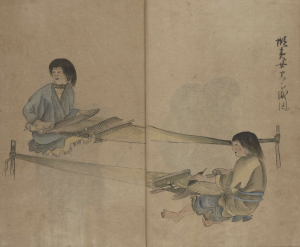AINU ELM BARK
Japan’s Indigenous Peoples, the Ainu, inhabitants of Hokkaidō island, are renowned for their robes made from ‘exchanges’ with botanical species, such as elm bark fibres. Their God-spirits (kamui) manifesting in flora, fauna, and natural forces, guided their respectful use of materials, ensuring that nothing was wasted. Their spiritual practices, in reverence for nature, contrast with today’s destructive driven fashions.
Textiles are often overlooked in the ecological humanities. This paper, through a framework rooted in Indigenous studies, environmental history, cultural anthropology and regenerative design, explores the ecological entanglements of human-nature coexistence, materiality and agency of elm bark fibre garments, weaving together their narratives, practices and environments.
The study highlights the ingenuity and sophisticated technologies that allow the transformation of plant fibres into durable garments essential in northern climates. It explores the Indigenous perceptions of nature and resource extraction, particularly during the pre-colonial and early colonial periods in Hokkaidō.
By exploring these traditions, this paper highlights the potential to inform sustainable fashion practices to move away from petroleum-based systems.
https://riviste.fupress.net/index.php/fh/article/view/2929/2027
- HEZHE FISH SKIN
- AINU ELM BARK
- INDIGENOUS ARCTIC FISH SKIN
- MAX PLANCK RESEARCH REPORT
- UAL TACKLING CLIMATE ISSUES
- SMITHSONIAN OCEAN MAGAZINE: FISH SKIN
- DA GALLIANO ALLA CULTURA INUIT
- LCF PHD RESEARCHER PROFILE: ELISA PALOMINO
- SMITHSONIAN MAGAZINE FISHSKIN
- INNOVATION IN THE NORTHERN DIMENSION COUNTRIES
- FISH SKIN A HISTORICAL MATERIAL
- YOMIURI SHIMBUM FISHSKIN
- ELISA PALOMINO HORIZON 2020 FISHSKIN CONSORTIUM
- BRINGING FISH SKIN TO MARKET
- UAL MEET ELISA PALOMINO
- TEXTILES, IDENTITY AND INNOVATION
- HAKAI MAGAZINE
- ARCTIC STUDIES CENTER NEWSLETTER
- UAL FISHSKIN
- UAL BRINGING FISHSKIN TO MARKET
- FISHSKIN CONFERENCE IN ICELAND 2019
- SDG 14 LIFE BELOW WATER FISHSKIN FOR FASHION
- ASC FASHION SKETCHBOOK WORKSHOP
- FULBRIGHT AWARD TO THE SMITHSONIAN INSTITUTION
- WENGFENG YOU HEZHEN FISHSKIN CRAFTSPERSON
- FISH SKIN NEW FRONTIER FOR ECOFRIENDLY FASHION
- SIX SUSTAINABLE ECO-FRIENDLY MATERIALS
- BUNKA GLOBAL FASHION
- SUSTAINABLE FASHION: FISH LEATHER
- NORDIC FISHSKIN WORKSHOP


